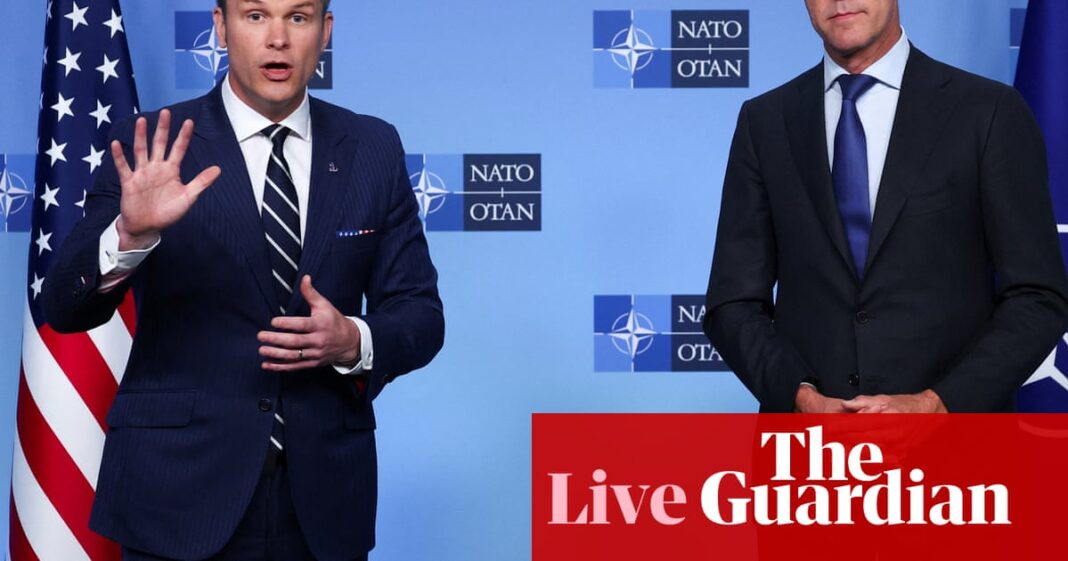Hegseth: Nato defence spending commitment of 5% of GDP ‘will happen’
A defence spending commitment of 5% of GDP across the Nato alliance will happen, US defence secretary Pete Hegseth told reporters in Brussels, ahead of the Nato defence ministers meeting.
Reuters reports that Hegseth said that to be an alliance, you had to be combat-ready.
“We’re here to continue the work that President Trump started, which is a commitment to 5% defence spending across this alliance, which we think will happen. It has to happen by the summit at The Hague later this month,” he said.
Key events
Pope urged Putin to make moves towards peace in Ukraine, Vatican says
Angela Giuffrida
Pope Leo urged the Russian president Vladimir Putin to make moves towards ending the war in Ukraine during a phone call on Wednesday, the Vatican said.
“The pope made an appeal for Russia to make a gesture that favours peace, emphasising the importance of dialogue for achieving positive contacts between the parties and seeking solutions to the conflict,” the Vatican said.
The statement added that the discussion focused on “the humanitarian situation, the need to facilitate aid where necessary, ongoing efforts for the exchange of prisoners, and the value of the work carried out in this regard by Cardinal (Matteo) Zuppi.”
Zuppi is the Vatican’s peace envoy for Ukraine.
The phone call was the first between the pair since Leo was elected pontiff last month. It came a few days after Pietro Parolin, the Vatican’s secretary of state, reiterated the Holy See’s availability to host peace talks.
The Kremlin said that Putin thanked the pope for offering to help settle the conflict, while telling him that Ukraine was intent on “escalating” the war.
Italy’s prime minister Giorgia Meloni has also tried to orchestrate Ukraine-Russia peace talks at the Vatican, although Russian officials have previously said it would not be a suitable location due to the two countries being largely Orthodox Christian.
Germany on tenterhooks for Merz’s first official meeting with Trump

Kate Connolly
The main event of the day – in late afternoon – will be German chancellor Friedrich Merz’s meeting with US president Donald Trump at the White House.
Our Berlin correspondent Kate Connolly says the event is putting political Berlin on tenterhooks like no other transatlantic encounter in living memory.
Discussions between the German chancellor and the US president will focus on Ukraine, the Middle East and trade policies.
How well or badly the talks go – during a small group meeting, followed by a lunch and then, perhaps most nailbitingly, a press conference in the Oval Office – may shape relations for decades to come, analysts say.
Having reportedly spoken by phone four times since Merz’s election win in February, swapped numbers and exchanged an undisclosed number of text messages, the two leaders are now on first-name terms – something that, culturally at least, doesn’t come easy to a German. German government advisers say it bodes well that they have dropped “Mr President” and “Chancellor” in favour of Donald and Friedrich.
But Merz knows the road to a normal friendship is thorny. The transatlantic relationship has been altered almost beyond recognition since Trump’s return to office, and the shock “sits very deep”, said Mariam Lau, a journalist and the author of a new in-depth portrayal of Merz.
Full analysis:

Lisa O’Carroll
UK trade secretary Jonathan Reynolds has also called for reforms of the WTO including changes to the much-criticised dispute resolutions system which can also take years to settle disputes between trading nations.
“We do recognise that reforming and repositioning the WTO so that it can respond more effectively to the challenges of today is the only way to safeguard long term stability and growth tomorrow.
“Our eyes are fixed on greater flexibility in decision making, greater openness in the east of plurilaterals and building a fully functioning dispute settlement system,” he told the European Policy Centre security conference.
“Whilst the world has changed, it is changing, and it’s going to change more quickly in future, and that climate is uncertain and volatile,”.
Arguing stronger ties with the EU and other allies were now more vital than ever, he added: “the trees that survive the storms aren’t the tallest. They’re the ones whose roots are intertwined with their lives.

Lisa O’Carroll
Back to Brussels, Nato and defence are not the only topics being discussed there today.
The EU’s trade commissioner Maroš Šefčovič has called for deep reform of World Trade Organization rules in the face of the continuing assault on the global rules based system by Donald Trump.
Just days after a series of meetings with the US, India, Australia and others, he said many developed economies were agreed that it was long overdue.
While the US trashes the rules based system, the rest of the world is pushing ahead with strengthening, but changing trade rules, was his message.
“Just in the past two days, during the OECD trade ministerial [summit] the message was clear and unequivocal – deep reform of the World Trade Organisation is long overdue and urgently needed to match today’s realities,” he said.
Speaking at the European Police Centre conference in Brussels, he said the EU was “doubling down on the rules based approach to trade” rather than joining Trump’s attack on decades old trading systems.
While the US seeks to coerce trading partners into deals, the EU was keeping an orderly position with the aim to improving prosperity with “We are here to improve the system, not to bend it to the point of breaking and certainly not to abandon it.”
He added the EU’s approach was this: “We negotiate. We do not isolate. We do not leave the table… trade agreements are more than transactions. They are upgrades that empower our partners, helping them grow with us and creating a cycle of shared prosperity.”
He also warned that “China’s impressive rise must not come at the expense of the European economy” and that the EU was “rebalancing this relationship and establishing a level playing field in trade and investment, with symmetrical market opening.”
Looking elsewhere, Italy is preparing for a national referendum this weekend on reducing the residence requirement for non-EU nationals seeking Italian citizenship from 10 years to 5 years, with many senior government figures trying to defeat the proposal by… encouraging people not to take part in the vote at all.
Jamie McKay, a writer and translator based in Florence, has this take on the vote in our opinion section.
The fact that this referendum is happening at all is therefore something of a miracle. For the past three decades, the Italian state has been tightening up its citizenship rules so that fewer and fewer are eligible. And the political wind is still blowing very much in that direction.
Defence ministers to agree on capability targets for Nato leaders’ meeting, Rutte says

Jakub Krupa
Opening the meeting this morning, Nato’s Mark Rutte noted it was “the last step on our road” to the Nato leaders’ summit in The Hague later this month.
He said the defence ministers will “agree an ambitious new set of capability targets to keep our 1 billion people safe, by keeping our deterrence and defence strong.”
“To make Nato a stronger, a fairer and a more lethal alliance, we need to spend more to reach these targets. But for today, the main focus is on the targets, and then, of course, the summit will decide on the spending,” he said.
Rutte also said the focus will be on ramping up production, as “we also have to produce more to defend ourselves, much more.”
“So today we will also prepare the new defence investment plan, which then, of course, Nato leaders will agree in the Summit in The Hague.”
“There is no security without strong defence, and there will be no lasting security without a secure Ukraine.”
And with that, the doors close, and the meeting gets under way.
Elsewhere, there’s plenty for us to follow today, including:
-
new EU plans on digital,
-
French president Emmanuel Macron welcoming Brazilian president Lula to Paris,
-
further coalition talks in Poland in the aftermath of the presidential election on Sunday,
-
and the main event later today, the German chancellor Friedrich Merz’s visit to the White House.
It’s Thursday, 5 June 2025, it’s Jakub Krupa here taking over from Martin Belam, and this is Europe Live.
Good morning.
Both Sweden and Latvia back raising defence spending to 5% of GDP among the nations in the Nato alliance.
Swedish defence minister Pål Jonson said his country, which joined the alliance in 2024 after a nearly two-year wait due to objections from Turkey and Hungary, would like to see Nato budgets at 5% of GDP by 2030.
Latvian defence minister Andris Sprūds, Reuters reports, said the 5% figure was crucial if the alliance was to meet its new targets.
Germany will need about 50,000 to 60,000 additional active troops under the new Nato targets, defence minister Boris Pistorius said in Brussels this morning.
Reuters reports that Pistorius said that Nato should make clear in its summit declaration that Russia is its greatest threat.
Ukraine’s defence minister said on Thursday that his country will receive up to €1.3bn for domestic weapons production in 2025 from allies after a conversation with his Danish counterpart.
The first tranche of €428m come from Denmark, Sweden, Canada, Norway and Iceland, Reuters reports Rustem Umerov said on the Telegram messaging app.
Secretary-general Rutte: Nato allies to agree on capability targets and considerable extra investment
Nato secretary-general Mark Rutte said on Thursday morning that he expects allies to agree on what he called historic new capability targets at the defence ministers’ meeting in Brussels.
Reuters reports he said that the goal was to better balance defence contributions between Europe, Canada, and the US.
Rutte also said there is a need to boost spending on air defences, long-range missiles, land forces, and command and control systems. He said it would be a considerable extra investment.
Hegseth: Nato defence spending commitment of 5% of GDP ‘will happen’
A defence spending commitment of 5% of GDP across the Nato alliance will happen, US defence secretary Pete Hegseth told reporters in Brussels, ahead of the Nato defence ministers meeting.
Reuters reports that Hegseth said that to be an alliance, you had to be combat-ready.
“We’re here to continue the work that President Trump started, which is a commitment to 5% defence spending across this alliance, which we think will happen. It has to happen by the summit at The Hague later this month,” he said.
Welcome and opening summary …
Good morning and welcome to our rolling coverage of Europe, where today the main focus to begin with is the Nato defence ministers meeting in Brussels. Here are the headlines …
-
A defence spending commitment of 5% of GDP across the Nato alliance will happen, US defense secretary Pete Hegseth has told reporters in Brussels
-
Nato’s secretary general Mark Rutte has said that new investment will equalise what the US, European nations and Canada have committed to spending. He said that Nato needed to invest in its capabilities to protect itself from being attacked
-
Germany’s new conservative leader, Friedrich Merz, is due in Washington on Thursday for his first official meeting with Donald Trump

